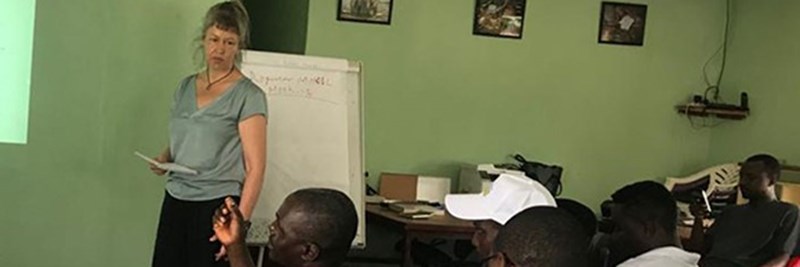In 2007 I spent a year working at the Witness and Victims Section of the Special Court for Sierra Leone. I heard first-hand about the ways in which the civil war had devastated the social fabric of the country, and destroyed the lives of individuals and families. Since then I’ve been back to Sierra Leone regularly, working for organisations including UNICEF and IRC, as well as providing ongoing support for a small local organisation, EducAid. In 2014 I worked with EducAid teachers during the Ebola outbreak and got a sense of the ways in which the epidemic impacted on the emotional and social wellbeing of the population.
I started working with RUHF in 2018, leading on the unit’s work to help strengthen supports for those affected by mental health problems in Sierra Leone. As we reviewed the literature, it became clear that the majority of research on mental health in the country has focused on the impact of extreme events, primarily the civil war and the Ebola outbreak. It has also mostly focused on those most affected by these events (e.g. children forcibly recruited into armed groups; Ebola survivors). Because we wanted to consider ways to address mental health in the general population outside of emergencies, we have been working to understand local concepts and expressions of distress. This is with a view to developing a culturally-appropriate tool to measure psychological distress to carry out surveys of distress across the country.
As we talked to community members, traditional healers, community leaders, faith leaders and others, it became clear to me that we need to broaden our understanding of the causes of psychological problems in Sierra Leone. Whilst they can often be triggered by extreme events such as the unexpected loss of loved ones, we need to shift our attention from the tragedies that have struck Sierra Leone and recognise the ongoing stressors that affect people day-to-day. This includes economic stress, as inflation increases the cost of basic essentials, as well as the sense of hopelessness of university graduates who do not find a place to use their newly-acquired skills and knowledge. It includes the anxiety and sadness of women who are abandoned by their partners, and left to take care of their children without financial, emotional and practical support. It even includes the ongoing frustration of those who have to go far to fetch water, who travel on inadequate and unsafe roads, and whose access to electricity is intermittent.
All these factors contribute to a high level of ongoing distress, and perhaps make it more likely that people will develop mental health problems when painful events occur.
All this makes it clear to me that supporting those with mental health problems in Sierra Leone requires the collaboration and commitment of those providing services across a variety of sectors in the country. Those responsible for economic development have a crucial role to play, as do those responsible for strengthening the infrastructure of the country. Their achievements can serve to prevent mental health problems developing and to strengthen wellbeing of individuals and communities, enabling them to contribute to the development of the society in which they live. Healthcare professionals and social workers can assist both prevention of and response to mental health problems, but this task will be so much easier if others also play their part.
Communities themselves have a crucial role, of course. Most of those affected by severe and ongoing distress receive support primarily from friends, family and informal helpers. There is some very inspiring work going on in Sierra Leone to strengthen mental health supports at community level. The Mental Health Coalition is particularly impressive. This is a coalition of mainly grassroots activists and civil society organisations - including those with lived experience of mental health issues – who have been working for years to raise awareness and reduce the stigma associated with mental health problems. They have limited funding, which mainly comes from the members themselves, but their solid grounding in the communities where they work makes them powerful advocates.
We were very pleased to have the opportunity in December 2019 to present the work we’ve been conducting in Sierra Leone to the Mental Health Coalition, and to listen to their feedback on our findings. They shared their thoughts on how our work might be of use to their members and others working on mental health issues in Sierra Leone. We will be building on what we learned from them and others as we work towards the next stage of our project. My hope is that the information and tools we develop can contribute to their ongoing work, and that of others, to strengthen mental health supports at a community level. This is where real change will begin.
By Dr Rebecca Horn








